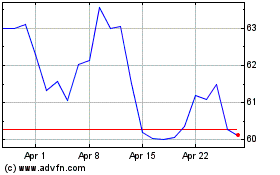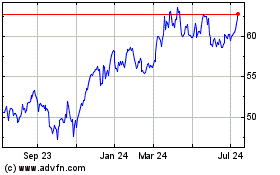Judge Casts Doubt on CFTC's Manipulation Case Against Trader
December 07 2016 - 7:20PM
Dow Jones News
The judge overseeing the market-manipulation trial of futures
trader Donald Wilson Jr. suggested that lawyers for the Commodity
Futures Trading Commission had failed to prove a crucial point as
they gave their closing arguments Wednesday.
U.S. District Judge Richard Sullivan repeatedly interrupted
closing arguments by lawyers for the CFTC, which alleges Mr. Wilson
and his firm, DRW Investments LLC, manipulated an interest-rate
contract in 2011 to yield $13 million in profits.
Judge Sullivan questioned whether the agency had successfully
proven that DRW's actions had created an artificial price for the
contract, which the CFTC must do to win its case.
"There are multiple elements to market manipulation and it's not
clear to me that you've proven a central one, which is
artificiality," Judge Sullivan said in a Manhattan courtroom.
Mr. Wilson, a prominent Chicago trader, faces the possibility of
a lifetime trading ban if he loses. He denies the civil allegations
and has refused to settle the lawsuit filed in 2013. The stakes are
also high for the CFTC, which has a spotty record in manipulation
cases.
Earlier in the trial, Judge Sullivan grilled Mr. Wilson over
evidence in the case, including an email in which a DRW trader
described companies that took the opposite side of the firm's trade
as "suckers".
But on Wednesday the judge's toughest questions were aimed at
the CFTC. He admonished the agency's lawyers for focusing on what
they described as "illegitimate" bids and sidestepping the issue of
whether DRW had caused an artificial price.
"You keep using 'illegitimacy', which is a very fuzzy term, to
somehow be the equivalent of artificiality," Judge Sullivan
said.
Arguing that DRW's bids created an artificial price because they
were made with an illicit intent was "so circular as to be
nonsensical," he added.
Michael Kim, a lawyer for DRW, argued that a victory for the
CFTC would effectively criminalize a broad swath of trading
activity as unlawful manipulation. "Under the CFTC's rule, it would
be illegal to buy any more of what you own at a higher price," he
said. "This is also bizarre."
The CFTC's allegations against DRW stem from a big trade in
interest-rate swap futures that the firm carried out in 2010 and
2011 on an exchange owned by Nasdaq Inc. The contracts allow
companies to bet on or protect against swings in rates.
DRW bought more than $350 million of the futures in late 2010,
expecting the position to rise in value, the CFTC said in its
lawsuit. In January 2011, the firm began placing bids in a
15-minute afternoon settlement window used by the exchange to
determine the contract's closing value at the end of the day. The
CFTC argues that those bids, which continued through August 2011,
were an illegal strategy called "banging the close" that was aimed
at enhancing the value of DRW's large position in the futures
contract.
"It's illegitimate to try to take advantage and seize control of
the settlement price," CFTC lawyer Traci Rodriguez said in court on
Wednesday.
DRW doesn't deny placing bids in the settlement window, but it
has described them as a lawful strategy that actually benefited the
markets. The firm says its bids helped fix a mispricing in a
contract that few other companies were trading.
Mr. Wilson and his lawyers said during the trial that DRW placed
the bids because it wanted to help develop a market in the Nasdaq
contract. The exchange ultimately shut down trading in the contract
due to a lack of interest.
Write to Alexander Osipovich at
alexander.osipovich@dowjones.com
(END) Dow Jones Newswires
December 07, 2016 19:05 ET (00:05 GMT)
Copyright (c) 2016 Dow Jones & Company, Inc.
Nasdaq (NASDAQ:NDAQ)
Historical Stock Chart
From Mar 2024 to Apr 2024

Nasdaq (NASDAQ:NDAQ)
Historical Stock Chart
From Apr 2023 to Apr 2024
